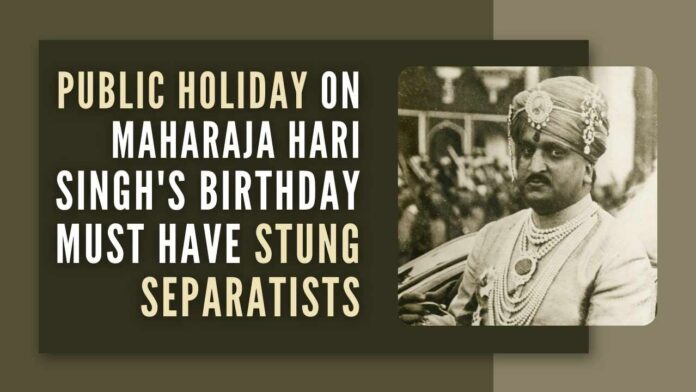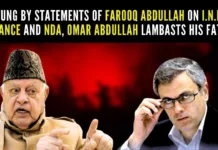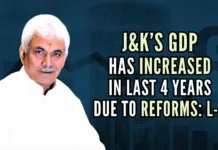
J&K to have a public holiday on Maharaja Hari Singh’s birthday
J&K LG Manoj Sinha has done it. Taking cognizance of the growing disaffection among the Jammu Dogras and appreciating their sentiment, he on September 15 conceded the age-old demand of seeking a public holiday on the birthday (September 23) of Maharaja Hari Singh. No wonder that the happy and jubilant Dogras across Jammu province celebrated the eventful day as a day of thanksgiving and termed it their crowning triumph.
And, why not? After all, Jammu, Kashmir, and Ladakh are within India because of Maharaja Hari Singh. It was he who defeated the sinister game plan of Pakistan and certain vested interests in Kashmir by exercising the authority vested in him by the Indian Independence Act 1947 and linked the fate of his state with India. J&K would have merged with the Indian Dominion even before October 26, 1947, had the then Government of India under JL Nehru accepted his accession offers. But it was not to be for reasons best known to it. It was only on October 26 that PM Nehru accepted the Instrument of Accession signed by Maharaja Hari Singh.
Earlier in 1927, two years after his coronation, Maharaja Hari Singh had held his ground firmly in Kashmir, which had been converted into a den of anti-Dogra intrigues by the canny imperialist London. There had been a demand in Kashmir that all the government posts in J&K, without any exception, be made the sole preserve of the majority community of Kashmir and that “if educated Muslims were not locally available, then educated Muslims to be imported from British India, especially from Punjab, so that they could man all the official positions in J&K”. Maharaja Hari Singh was fully aware of the implications and dangerous ramifications of the demand in Kashmir. He upset their communal applecart through his State Subject Definition of 1927. It is a different story that vested interests in Kashmir opposed tooth and nail till October 1947 his State Subject Definition and fought for it after 1947 to hold the people of J&K aloof from the national mainstream.
Not just this, nationalist of nationalists and patriot of patriots as he was, he also challenged the British rule in India during the First Round Table Conference (Nov 1930-Jan 1931) in London knowing it full well that the angry Britons would exploit certain vested interests in Kashmir and create more troubles for the Dogra rule in the Valley. The communal and anti-Dogra explosions which rocked Kashmir after 1930, including the 1931 riots and 1946 Quit Kashmir Movement, were the immediate fallouts of conspiratorial activities indulged in by London and its representatives in India, including the Viceroy and Governor-General, and vested interests in Kashmir, who considered the Dogras and Dogra rulers “aliens and oppressors” and wanted the British government to abrogate the Treaty of Amritsar 1846 under which Kashmir had become part of the mighty Dogra Kingdom comprising the whole of Jammu province and the whole of the trans-Himalayan Ladakh, including Gilgit-Baltistan. It goes to the credit of Maharaja Hari Singh that he surmounted all the problems the British imperialists and anti-Dogra elements in Kashmir created. He knew how to deal with the rebels.
The manner in which Maharaja Hari Singh maintained the unity and integrity of his state after 1925 and acceded J&K to India in 1947 constituted just one part of the story of his splendid contribution. The other part of the story was equally inspiring and commendable.
Maharaja Hari Singh was not just an integrationist par excellence. He was also an able, effective, and skillful administrator, a great social reformer, and also a democrat in his own right. It was he who handed down a fair and just administration to the people. Who can forget his first public speech delivered in 1926, which, inter-alia, read: “If I am considered worth governing this state, then I will say that for me all communities, religions, and races are equal. As a ruler, I have no religion; all religions are mine and my religion is JUSTICE. It is possible that while dispensing justice I may commit mistakes. To err is human. One who says that he doesn’t commit a mistake is not speaking the truth. Only God is free of error. My duty is to look at everyone with equality. I shall, as far as possible, work with justice”. And, he did work with justice.
It was none other than Maharaja Hari Singh who established a full-fledged High Court in J&K in 1928 and set up a Board of Judicial Advisors in 1939 whose duty it was to hear appeals against the High Court’s judgments. In between, he established 75-member Praja Sabha (Legislative Assembly) in 1934 consisting of elected and nominated members. His whole objective was to associate the people of his state with the law-making processes and governance of the state. It was he who threw open public wells, tanks, temples, and educational institutions to the members of depressed classes, now called SCs. It was he who on October 31, 1932, declared that the members of these classes will be allowed to enter all the temples and did away with those practices under which the justice system could discriminate between persons on the basis of caste. It was he who declared child marriages unlawful (1928), encouraged widow remarriage by enacting a law (1933), suppressed prostitution and closed brothels (1934), and prohibited polygamy (1941). Again, it was he who abolished infanticide and untouchability, granted proprietary rights to peasants and freed them from the clutches of money lenders. Similarly, his contribution to national-building education and other departments was just spectacular.
The whole point is that Maharaja Hari Singh occupies a unique position not only in the history of J&K but also in the history of India. It’s a matter of great satisfaction that the government finally recognized his contributions and declared his birthday a public holiday. The decision must have stung Pakistan and separatists and half-separatists of all varieties in Kashmir.
Note:
1. Text in Blue points to additional data on the topic.
2. The views expressed here are those of the author and do not necessarily represent or reflect the views of PGurus.
PGurus is now on Telegram. Click here to join our channel and stay updated with all the latest news and views
For all the latest updates, download PGurus App.
- ‘Kashmir My core constituency’: Revisiting July 12, 2003 to understand politics, Omar Abdullah-style - March 15, 2024
- Total deviation from traditional approach: Seven takeaways from PM Modi’s March 7 Srinagar visit - March 9, 2024
- Status of political parties: Why is further J&K reorganization imperative? - March 1, 2024










